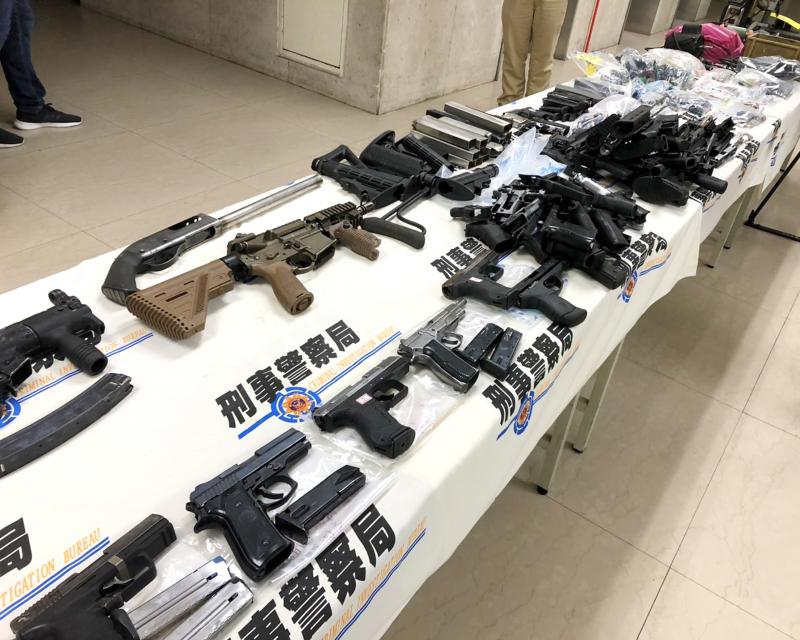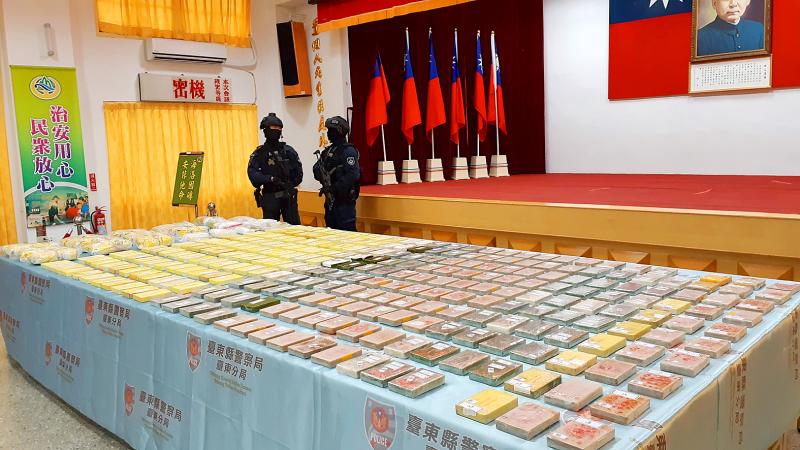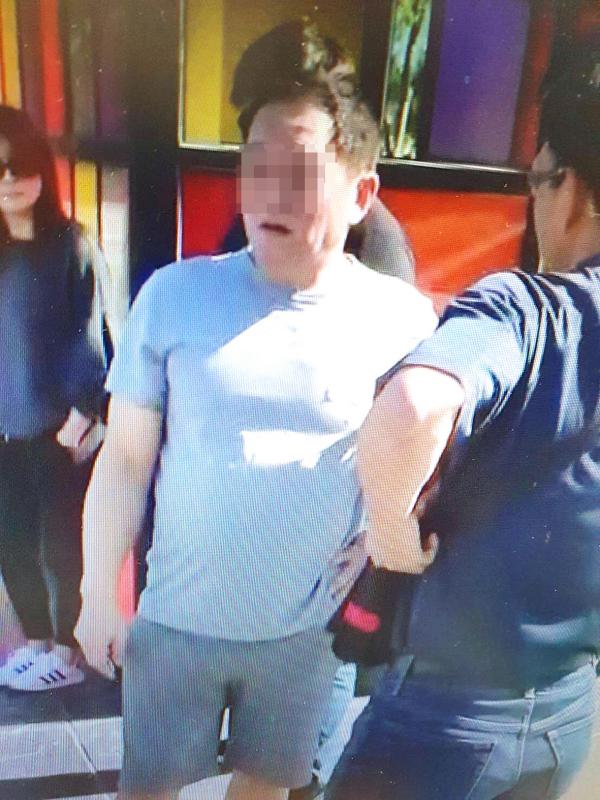Longtime Taiwan-based political commentator J. Michael Cole pointed out this week in the Global Taiwan Brief that a real and serious threat to Taiwan is the potential that its current “gray zone” tactics could be carried further via Chinese Communist Party (CCP) sponsorship of “substate actors” in Taiwan to carry out assassinations and foment social unrest.
Cole instances Russia’s intervention in Ukraine using substate actors. Cole observes that many Taiwan organized crime gangs, including the largest and most pervasive, are pro-China and have long practiced the art of funneling weapons and funds through their networks in Asia. They would make ideal agents for substate actions against Taiwan. Indeed, according to Cole, they already have.
CCP EXPLOITATION

Photo: Chiu Chun-fu, Taipei Times
Use of substate actors is an old strategy, dating back to the Greeks. Recent examples abound, from Nazi German use of the Sudeten German Party in Czechoslovakia to the CIA-fostered Bay of Pigs invasion. Taiwan, sadly, has an abundance of groups that could be exploited by the CCP.
Consider the kind of networks operated by someone like Lin Hsiao-tao (林孝道), the drug kingpin based in Pingtung, who at one time was allegedly the source for roughly a third of the drugs in Taiwan. Lin had a network that stretched from the Shan State of Myanmar across Asia to Japan, South Korea, the Philippines and Indonesia. Among his numerous assets was a flotilla of large fishing vessels registered through third parties in Panama, or in places like Bolivia. He used the boats to transport drugs, staffed them with soldiers hired from the rebels in Mindanao, and spent lavishly on small arms, including rocket artillery. Equipped with desalination systems, his largest ship would stay at sea 300 days a year.
Drug networks like Lin’s are hardly the only gray and black links that operate between China and Taiwan. The underground banking system is of course legendary. Less well known are the complex networks for smuggling art objects out of China and into Taiwan that have operated for decades. In the 1990s, for example, one method of smuggling involved wrapping the object in waterproof plastic and attaching an electronic signaling device to it. Fishing boats would arrive off Taiwan from China, dump the smuggled objects in the water just outside a port, and local contacts would track them with the signal and recover the smuggled object. Such networks could easily be re-purposed.

Photo: Huang Ming-tang, Taipei Times
Alongside covert links, there are numerous networks, such as religious, cultural and business associations, that operate right out in the open, have strong links to China and advocate pro-China political and economic positions. There are even formal political parties in Taiwan that are strongly pro-China.
It is not difficult to imagine what kind of uses such networks could be put to if China wanted to make trouble in Taiwan.
Ukraine also suggests another problem that Taiwan will encounter: China not stopping the pressure when independence is achieved. We already have historical examples of that from recent CCP history in the invasions of East Turkestan and Tibet.

Photo: Chiu Chun-fu, Taipei Times
Nations do not easily let go of claimed or once-ruled territories and often continue to interfere in their economic and political life. All along its borders — not merely in Ukraine — Russia continues to make trouble in its former imperial territories. This is also a problem for former colonies. The Philippines has struggled for decades with US dominance of its economy and politics. The UK maintains its Commonwealth, while several of France’s former colonies in Africa still use the CFA Franc — the currency used in many French-speaking West African countries and overseen by France.
Time appears to be no impediment to this demand. It has been roughly two hundred years since Vietnamese rulers incorporated a chunk of Khmer lands into southern Vietnam, but Cambodia still nurtures a claim to that territory. In Turkey many still entertain dreams of an Ottoman revival. These claims often have a comic-opera element that could easily become seriously destructive — recall the abortive “invasion” in 2013 of Sabah in Malaysia by a small group of followers of Jamalul Kiram III, who claimed to be the Sultan of Sulu and the real ruler of Sabah. In 1967 then-president Ferdinand Marcos organized a secret commando unit to destabilize and take over Sabah state, but the attempt never materialized. Today the Philippines sometimes still claims that Sabah belongs not to Malaysia, but to Manila.
Nothing in the history of the CCP’s aggression and territorial expansion suggest that the pressure will stop.
ORGANIZED CRIME
An indicative moment made it into the English news this week. A party of 10 men in black chased a police officer into a police station in the wee hours of the morning, then smashed a few laptops in the station when they couldn’t get their hands on the officer.
Though it later turned out to be innocuous, the interpenetration of ordinary Taiwanese life by gangsters is widely known by foreigners who live here for any length of time, but it seldom makes the English-language news. Yet gangsters run many of the nation’s businesses, large and small. A few years ago, for example, the head of a major intercity bus line was killed in what appeared to be a gangland hit. In markets all over Taiwan the butcher stalls are run by people studded with tattoos. Have a kid in a cram school studying English? Several I have worked at were owned by gangsters — schools are a fabulous way to launder dirty money.
The world of organized crime, and its problematic relationship to other institutions of society like the customs service and the police, is generally shrugged off as an intractable local problem. It is not: ensconced in transnational networks of crime that the CCP could easily exploit, organized crime is a vital national security issue. And it is only going to get worse.
Taiwan is facing the same problem that many other democracies are facing: the existence of groups within the national polity that use democratic values, local social frameworks and legal systems to subvert democracy.
Against the background of CCP pressure and its expanding use of “gray zone” tactics, it is absolutely imperative that Taiwan not only formulate internationally supported responses to China’s overt tactics like flooding its waters with sand dredgers and its air with planes, but also address its issues of organized crime and institutional corruption.
Far reaching reforms are no longer merely a way of making society a better place to live in.
They are now literally a matter of life and death.
Notes from Central Taiwan is a column written by long-term resident Michael Turton, who provides incisive commentary informed by three decades of living in and writing about his adoptive country.

Jacques Poissant’s suffering stopped the day he asked his daughter if it would be “cowardly to ask to be helped to die.” The retired Canadian insurance adviser was 93, and “was wasting away” after a long battle with prostate cancer. “He no longer had any zest for life,” Josee Poissant said. Last year her mother made the same choice at 96 when she realized she would not be getting out of hospital. She died surrounded by her children and their partners listening to the music she loved. “She was at peace. She sang until she went to sleep.” Josee Poissant remembers it as a beautiful

Before the last section of the round-the-island railway was electrified, one old blue train still chugged back and forth between Pingtung County’s Fangliao (枋寮) and Taitung (台東) stations once a day. It was so slow, was so hot (it had no air conditioning) and covered such a short distance, that the low fare still failed to attract many riders. This relic of the past was finally retired when the South Link Line was fully electrified on Dec. 23, 2020. A wave of nostalgia surrounded the termination of the Ordinary Train service, as these train carriages had been in use for decades

March 2 to March 8 Gunfire rang out along the shore of the frontline island of Lieyu (烈嶼) on a foggy afternoon on March 7, 1987. By the time it was over, about 20 unarmed Vietnamese refugees — men, women, elderly and children — were dead. They were hastily buried, followed by decades of silence. Months later, opposition politicians and journalists tried to uncover what had happened, but conflicting accounts only deepened the confusion. One version suggested that government troops had mistakenly killed their own operatives attempting to return home from Vietnam. The military maintained that the

Lori Sepich smoked for years and sometimes skipped taking her blood pressure medicine. But she never thought she’d have a heart attack. The possibility “just wasn’t registering with me,” said the 64-year-old from Memphis, Tennessee, who suffered two of them 13 years apart. She’s far from alone. More than 60 million women in the US live with cardiovascular disease, which includes heart disease as well as stroke, heart failure and atrial fibrillation. And despite the myth that heart attacks mostly strike men, women are vulnerable too. Overall in the US, 1 in 5 women dies of cardiovascular disease each year, 37,000 of them